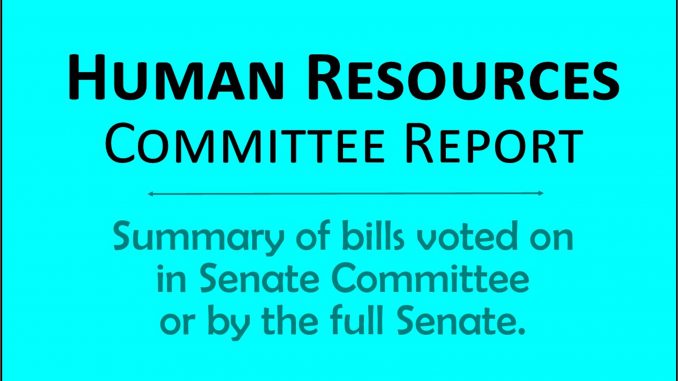
SF 563 – Pharmacy Benefit Manager’s annual report
SF 565 – Eliminating prior authorization for certain substance abuse treatment
HF 292 – Medicaid appeals report
HF 570 – HCBS Brain Injury cap
HF 606 – Online continuing education for social workers, therapists and counselors
HF 690 – Children’s Mental Health
HF 691 – MHDS regions fund balances
HF 731 – Mandatory reporter training requirements
FLOOR ACTION:
SF 563 – Pharmacy Benefit Manager’s annual report
SF 563, which was returned from the House with an amendment, requires a Pharmacy Benefit Manager to submit an annual report to the Insurance Commissioner regarding fees, drug prices and rebates received by the Pharmacy Benefit Manager in the aggregate. The reporting requirement is applicable to plans issued in 2019.
[4/27: 49-0 (Excused: Guth)]
SF 565 – Eliminating prior authorization for certain substance abuse treatment
SF 565 removes prior authorization requirements in Medicaid fee-for-service and managed care for Medication Assisted Treatment (MAT) for substance use disorders when these medications are used: Methadone; Buprenorphine; Naloxone; Buprenorphine and Naloxone combination; and Naltrexone.
[4/11: 49-0 (Excused: Brown)]
HF 292 – Medicaid appeals report
HF 292 requires the Department of Human Services (DHS) to report their analysis and findings relative to Medicaid member appeals that have been dismissed, withdrawn or overturned to determine if there are any negative patterns or trends. Current law requires them to report this information twice per year. This bill requires twice-per-year reporting until 2021, when the schedule will return to once per year.
[4/16: 49-0 (Excused: Shipley)]
HF 423 – Medicaid for inmates
HF 423 provides that Medicaid coverage of an inmate of a public institution will be suspended, but not terminated, after the first 30 days of commitment, and that the suspension will continue during the entire period of the inmate’s commitment to the public institution. Previously, the law allowed the suspension to continue for up to the initial 12 months of an inmate’s period of commitment, at which time the inmate’s Medicaid coverage would be terminated. [4/17: 50-0]
HF 532 – Medical residencies
HF 532 requires the Medical Residency Training state matching grants program and the awarding of primary care (including psychiatry) residencies by the University of Iowa Hospitals and Clinics (UIHC) to give priority to eligible applicants who are residents of Iowa, attended and earned an undergraduate degree from an Iowa college or university, or attended and earned a medical degree from a medical school in Iowa. The bill also directs the UIHC to allow Des Moines University fourth-year students to take elective classes at Carver College of Medicine if space is available. The University of Iowa’s College of Medicine must conduct a study of the state’s workforce challenges in recruiting and retaining primary and specialty care physicians.
[4/16: 49-0 (Excused: Shipley)]
HF 570 – HCBS Brain Injury cap
HF 570 removes the monthly Medicaid cap for those on the brain injury home and community-based services (HCBS) waiver; and requires the Iowa Department of Human Services to track the average amount expended per waiver recipient each fiscal year and report the information annually to the Governor and the Legislature by October 1. [4/16: 49-0 (Excused: Shipley)]
HF 606 – Online continuing education for social workers, therapists and counselors
HF 606 prohibits the Board of Social Work from limiting the number of continuing education credits that social workers may obtain online and the Board of Behavioral Science from limiting the number of continuing education credits that marital and family therapists and mental health counselors may obtain online. It requires programs providing the continuing education credits online to comply with standards set by the appropriate board.
[4/16: 49-0 (Excused: Shipley)]
HF 690 – Children’s Mental Health
HF 690 codifies that the Children’s State Board will provide oversight to the Children’s Mental Health System. It sets up the regional governance structure for the children’s system by adding members and advisory councils to the current Mental Health and Disability Services (MHDS) Regional governing boards. The MHDS regional boards must hire a children’s coordinator. Eligibility for services is defined, as well as core services. No new funding mechanism is established.
[4/16: 46-2 (No: Guth, Hogg; Excused: Dawson, Shipley)]
HF 691 – MHDS regions fund balances
HF 691 modifies the amount of excess funds counties can retain for cash flow for the adult Mental Health and Disability Services (MH/DS) system. Beginning in FY24, counties are limited to a fund balance reserved for cash flow of 40 percent of gross expenditures. Counties must reduce their levies by any dollar amount in excess of 40 percent beginning in FY24. If the bill takes effect on or after March 15, 2019, a county may recertify its budget as necessary to implement the provisions of the bill. In addition, MH/DS regions may amend a regional service system management plan or annual service and budget plan for FY19 and FY20. The bill strikes the current requirements of 20 or 25 percent cap on fund balances.
[4/17: 50-0]
HF 731 – Mandatory reporter training requirements
HF 731 is based on an interim workgroup’s recommendations regarding mandatory reporter training requirements. The training is for child abuse and dependent adult abuse. The frequency of the required refresher training is changed from every five years to every three years. The training is two hours. The training is to be developed and provided by the Iowa Department of Human Services (previously many curriculums were developed by numerous groups and approved by the Iowa Department of Public Health). An employer may provide supplemental training specific to the person’s professional practice.
[4/17: 49-0 (Excused: Guth)]
